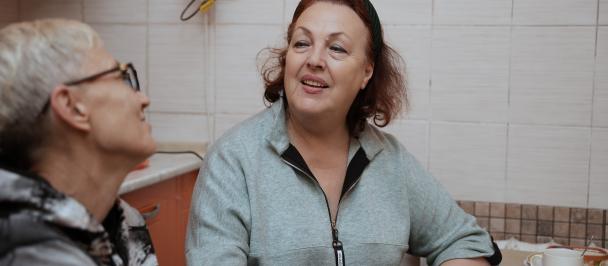Regaining lost ground against TB
March 23, 2023

Community-based health services in Angola promote tuberculosis awareness, testing and treatment to help defeat TB.
This is a year of hope, as the world looks to the second UN high-level meeting on tuberculosis (TB) in September and redoubles efforts to regain lost ground in the fight against TB.
The COVID-19 pandemic reversed progress against TB, the world’s second deadliest infectious disease. It disrupted TB services, while conflicts and cost of living crises continue driving TB risk.
During the pandemic, TB incidence rates increased for the first time in over a decade. Death rates have increased for the second year in a row, reversing years of decline since 2005 and progress towards global TB targets and the Sustainable Development Goals.
With the Global Fund, countries, communities and partners, UNDP is strengthening health services and employing improved diagnostic tools and treatments to fight TB.
Crucially, these programmes increase access to TB services among vulnerable and underserved populations disproportionately affected by TB, which is critical to defeating the disease.
Engaging communities directly to leave no one behind
In Angola, community-based health services are essential to widening access to TB testing and treatment. Health service coverage is low, with 60 percent of TB services located in Luanda, the capital. Accessing health services is especially difficult for lower income people in rural areas, who spend a sizeable portion of their incomes on health expenses.
Through Development Aid from People to People, UNDP supports community health workers to deliver TB education, contact tracing and patient screening and referral services. The health workers are a vital link between residents and health facilities. After each confirmed case, they conduct home visits, deliver medicines and advise patients to complete their treatment.
In 2022, the Government of Angola, UNDP and Global Fund partnership to fight TB reached 95 percent of its target for case reporting, a significant indication that patients are being found. Among those cases, 80 percent were cured of TB.
Community health services were key to achieving these results. Its more personalized approach encouraged people who might not have accessed TB services to get tested and treated, which saves lives and prevents new infections.
Speeding up testing and treatment decisions with new diagnostics
Kiribati and the Republic of the Marshall Islands are among the top countries in the Western Pacific region for their TB burden. Limited in-country laboratory and testing capacity means timely diagnosis and treatment is challenging, especially for remote communities.
As part of a Global Fund-financed Regional Grant, UNDP supports testing for drug-resistant TB in the two countries. Through the Pacific TB Laboratory Initiative, TB samples are sent to reference laboratories in countries such as Australia for testing with advanced diagnostic tools.
However, long shipping distances create delays for patients, who need the correct and timely diagnosis to make treatment plans. Delays have been exacerbated by logistical challenges and higher costs due to COVID-19.
Recently, UNDP supported the health ministries of Kiribati and the Marshall Islands to procure 10-color GeneXpert machines to, with deliveries scheduled for an additional nine countries in the region.
As a portable system, GeneXpert provides rapid testing at both point-of-care and hospital settings. This will allow more patients to access quicker diagnosis and start appropriate treatment sooner, while limiting further transmission. This latest technology also detects resistance to six commonly prescribed TB medicines within 90 minutes. Lastly, these machines will also boost diagnostic capacity for other pathogens such as SARS-CoV-2, which causes COVID-19.
Strengthening human resources for health and people-centred care
In South Sudan, the fight against drug-resistant TB has ramped up since the first case in 2018. But low health service coverage and insufficient clinical staff make managing TB cases difficult. Population displacement due to violence can interrupt TB treatment, further increasing the risk of drug resistance.
UNDP is strengthening human resources for TB case management. With the Ministry of Health, Arkangelo Ali Association and Cordaid, UNDP trained 100 health workers across 48 health facilities in drug-resistant TB care, including daily treatment administration, side effects monitoring and disease prevention. Capacity development included train-the-trainer sessions to scale-up knowledge of multidrug-resistant TB services. In total, the TB programme supports TB and HIV services in 172 health facilities.
UNDP is also supporting people-centred care and shorter treatment regimens. Installing more GeneXpert machines enabled the decentralization of drug-resistant TB treatment from one to 43 state- and county-level hospitals to bring services closer to patients, while also strengthening diagnostic capacity for other pathogens.
In addition, UNDP supported patient stipends to offset travel expenses and encourage treatment completion. UNDP is supporting health education, monthly follow-up clinics, home visits and shorter bedaquiline-based drug regimens, which can improve treatment adherence.
In 2022, the Global Fund-supported programme achieved a treatment success rate of 90 percent for all drug-resistant TB patients.
Accelerating the fight against TB
Whether it is community health services, diagnostic capacity, or human resources and people-centred care, these diverse approaches to strengthening TB services are critical to regaining lost ground against TB. They increase access to TB services to leave no one behind.
As we mark World TB Day, we must commit to investing in solutions that accelerate progress against TB, while building strong and resilient health systems for the future.

 Locations
Locations




